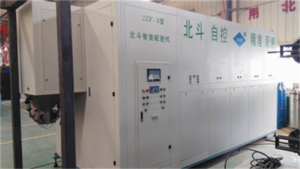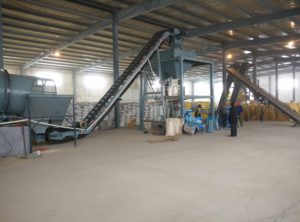The Absorption Degree of Fertilizer
Best automatic sewing machine High-tech bagging machine Twin extruder machinery
The absorption degree of fertilizer is related to a variety of factors.
In the growth cycle, the plant roots need to absorb water and nutrients all the time. Therefore, after fertilization , the plant can immediately absorb nutrients. Of course, the absorption amount and extent is not only related to the environment, but also related to the degree of water solubility of fertilizer. For example, nitrogen and potassium are easily absorbed as well as the crystal granular is more easy inhaled than powder. There are some substances which are difficult to be absorbed like calcium, boron, ion state, minerals, so they need to be converted into the form are easy to be absorbed.
nitrogen and potassium are easily absorbed as well as the crystal granular is more easy inhaled than powder. There are some substances which are difficult to be absorbed like calcium, boron, ion state, minerals, so they need to be converted into the form are easy to be absorbed.
The products are produced with new technology is conducive to the absorption of fertilizer.
Some people will say: No, many teachers said that the phosphate does not move in the soil inside.
That is right because the previous fertilizer are granular which the range of available phosphorus is relatively small. But now the water solubility of a lot fertilizer is very high and the technology also has been reformed. So, if you are using the fertilizer with relatively high water solubility and the environment is suitable, the fertilizer will get into the plant in the day. Therefore, whether the nutrients will be absorbed by plants or not is related to soil nutrient concentration, soil moisture content, temperature, fertilizer type, fertilizer solubility and other factors.
Three Forms of Soil Nutrient Transfer
There are three  forms of soil nutrients transfer: interception, mass flow and diffusion. The transfer form of nitrogen mainly is mass flow while phosphorus and potassium is diffusion. Analyzing from the soil nutrient concentration and soil moisture content, we can learn that root with high concentration of will have more chances to contact with the amount of nutrients; and the concentration gradient, root nutrients and water content are high; the unit with high concentration have more nutrients, the carrying quality is high, which is the factors influence plant nutrients absorption.
forms of soil nutrients transfer: interception, mass flow and diffusion. The transfer form of nitrogen mainly is mass flow while phosphorus and potassium is diffusion. Analyzing from the soil nutrient concentration and soil moisture content, we can learn that root with high concentration of will have more chances to contact with the amount of nutrients; and the concentration gradient, root nutrients and water content are high; the unit with high concentration have more nutrients, the carrying quality is high, which is the factors influence plant nutrients absorption.
Little tips:
Nine factors influence fertilizer absorption
1, Excess nutrients will affect the fertilizer effect and plant lack of elements will generate physiological barrier so that affect the plant growth. However, if one kind of element is excessive, the other kind of element will be absorbed which will also influence plant growth.
2, The pH affect of fertilizer effect: PH value range of 5.5-6.5 will good for fertilizer effect, such as iron, copper, manganese, zinc and other nutrients.
3, different growth period affect the fertilizer effect:  nitrogen, phosphorus and potassium and trace elements balanced fertilizer play an important role in vegetative growth period. Phosphorus and assium-based fertilizer are the main fertilizer in the flower bud differentiation and flowering period to promote root development and flowering.
nitrogen, phosphorus and potassium and trace elements balanced fertilizer play an important role in vegetative growth period. Phosphorus and assium-based fertilizer are the main fertilizer in the flower bud differentiation and flowering period to promote root development and flowering.
4, The different physiological characteristics of plants affect fertilizer effect: the use of special fertilizer should base on the actual physiological conditions with the corresponding use of other models of water soluble fertilizer.
5, Different media affects Fertilizer effect: soil cultivation and soilless cultivation, fertilizer formulations are different.
6, Different water quality affect fertilizer effect: apply acidic fertilizer or softened water quality in hard water and apply calcium and magnesium fertilizer in soft water.
7, fertilization time affect the fertilizer effect: the best time for fertilization is before 10 am and after 4 pm. In addition, we should try to avoid fertilizer at noon or in rainy days.
8, Fertilizer types affect the fertilizer effect: different flowers, different growth stages will use different formulations of fertilizer. Apply slow release fertilizer and water fertilizer, and use for root and foliar spraying will improve fertilizer efficiency.
9, the proportion of fertilizer imbalance affect the fertilizer effect: scientific fertilization is to promote elements absorption and avoid antagonism.
The article is quoted from: http://www.fert.cn/news/2017/09/04/114359807869.shtml
Previous: The Fertilizers Containing Bacteria to Soil
Next: Adjust Organic Fertilizer Measures to Local Conditions
